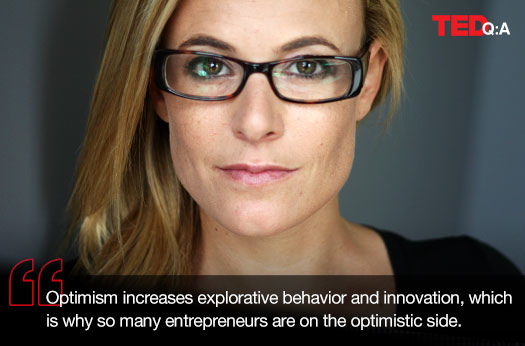The mad rush of the holidays can stress out the sunniest soul, and yet somehow, beneath it all, we remain cheerfully optimistic. We look ahead, make New Year’s resolutions and generally believe next year will be better than this one and the year before. Why? Tali Sharot, who spoke at TED2012, says we homo sapiens are genetically predisposed to look on the bright side. In her new TED ebook, The Science of Optimism: Why We’re Hard-Wired for Hope, Sharot explains why we’re biologically tuned to be positive.
In your book you note that people are genetically predisposed to be optimistic. What advantage does that provide?
Overall, optimism is a good thing. We now know that underestimating the obstacles life has in store lowers stress and anxiety, leading to better health and well being — this is one reason why optimists recover faster from illnesses and live longer. For example, a study of cancer patients revealed that pessimistic patients under the age of 60 were more likely to die within eight months than non-pessimistic patients of the same initial health, status, and age. Optimists are also more likely to take actions that promote health. Researchers studying heart attack patients have found that optimists were more likely than non-optimistic patients to take vitamins, eat low fat diets and exercise, thereby reducing their overall coronary risk. Also, believing that a goal is attainable motivates us to execute actions that will help us get closer to our dreams. Optimism increases explorative behavior and innovation, which is why so many entrepreneurs are on the optimistic side.
Why do people maintain this rosy bias even when information challenging our upbeat forecasts is so readily available?
Our brain tends to engage more in positive thoughts of the future than negative. This is the result of an interaction between deep structures in our brain that process emotion and motivation (such as the amygdala and striatum) and parts of our frontal lobes that modulate them (frontal lobes). Most importantly, when people learn what the future may hold, our neurons efficiently encode unexpectedly good information, but fail to incorporate information that is unexpectedly bad — rendering us more optimistic.
Are there disadvantages to being optimistic?
Yes, making assumptions that are too positive can lead to disastrous miscalculations.
If we underestimate our risks we might be less likely to take precautionary actions; less likely to get health checkups, apply sunscreen or open a saving account. Optimism can also results in bad planning — we tend to think projects will take less time to complete and cost less than they end up. Think house renovation or planning a wedding.
Can this form of inherent optimism help breed success?
Optimism pushes us to take chances — attempt a new job, a new relationship. It also acts as a self-fulfilling prophecy, as believing a goal is attainable makes it more likely to be. This is why optimism has been related to success in many domains including sports, academia, business, politics. However, there are pitfalls — for example, the optimism bias is thought to be a leading cause for the 2008 global economic collapse.
Are we more optimistic at a certain age? Or if we live in a certain area of the world?
Older people seem to be more optimistic and happier than college students and middle age adults — this surprised me. You would think that with more life experience we become more realistic — better able to see the future clearly. Turns out that’s not true. I expand on this counterintuitive result in the book. There is no evidence as of yet that people are more optimistic in certain parts of the world — that is something we should test.
Are you an optimist?
We are not so good at assessing our own optimism. Many times people arrive in my lab and say “I am a realist” or even “I am a pessimist”, but when you test them — compare their expectations to outcomes — you find they are as optimistic as the next guy. That is how the optimism bias works — we think our expectations are realistic, but they tend to be slightly on the optimistic side. So the only way to measure optimism accurately is to use the empirical tests we and others have developed. The problem is that I know these tests inside out, so there is no point testing myself. My guess is that I am as optimistic as the average reader, which means I hold mild optimism. That being said, I expect 2013 to be a great year! Happy holidays.
The Science of Optimism: Why We’re Hard-Wired for Hope is part of the TED Books series. It is available for the Kindle and Nook, as well as through the iBookstore. Or download the TED Books app for your iPad or iPhone.

Comments (6)
Pingback: Shiver With … | Tony's Texts
Pingback: Robert JR Graham » Become An Optimist
Pingback: Musings: World Without End… | Mirth and Motivation
Pingback: There’s no synonym for optimism.